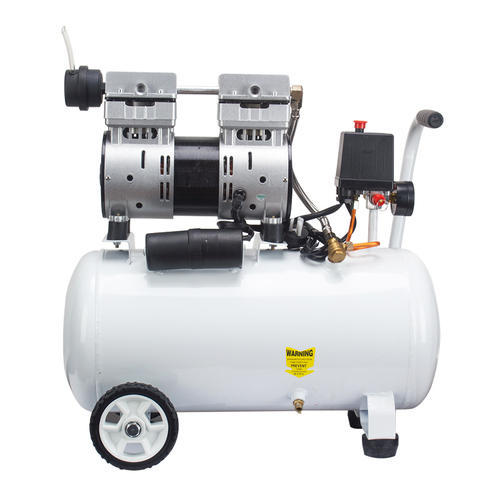There are two main types of compressors. In layman’s terms, they are compressors with oil and compressors without oil. The former are also known as oil-flooded or oil-injected.
The latter, oil free designs, do not use oil on the cylinder walls. These compressors depend on the self-lubricating materials to allow the piston to slide in the cylinder. This article will provide information about the benefits of oil free air compressors.
They are Versatile
Normally, oil-free compressors are driven by a 120-volt electric motor and can provide an average of 3.5 cubic feet per minute (cfm) of air flow. This is sufficient to finish work inside a structure. Oil-injected compressors are much more powerful, being able to deliver 10 to 25 cfm of air, but this is not necessary for the vast majority of DIY initiatives or other small-scale operations.
Lower Cost of Ownership
Over its lifetime, an oil-free compressor will offer a lower cost of ownership for two reasons. First, its initial buying price is lower. Second, it does not require oil changes. Oil-free compressors typically have a life cycle of around 200 hours, but higher-end units can last up to 2,000 hours with a much lower purchase price and ongoing maintenance cost.
Thanks to technology advancements, new higher-end oil-free compressors are much better than the old oil-free ones. The extended life cycle of up to 2,000 hours renders these products comparable to some conventional oil-lubed styles in this regard.
Quieter
In the same line of thought, advancements have rendered oil free compressors much quieter than their conventional counterparts. New oil free models run up to 15 dBA quieter than oil-free compressors using older technology.
To a large extent, the materials used in the sealing rings on the pistons drive most of these advancements in oil-free units. What is more, most high-end oil-free compressors have pumps that run a speed twice as low as that of older generation ones. This makes the units inherently quieter because they are running slower and also contributes to longer product life.
No Risk of Contamination
In most applications, air purity is critical. In some, air contaminated with oil or even the tiniest drop of oil can lead to a recall or cause product spoilage. It can also damage production equipment. Various industries have been working on stringent quality standards to ensure safety of both end users and manufacturing processes. Oil free compressors are guaranteed to meet the strictest safety standard in this respect, which is ISO 8573-1 Class Zero.
For the compressed air applications where meeting the highest air purity standards is key, oil-free air compressors can be the perfect solution. You can achieve 100% dry oil-free air supply with the use of various oil-less compressor technologies such as water injected screw, scroll, or two stage dry screw depending on your needs and requirements.
In some cases, like with food production facilities, an oil-free air compressor is a must because the consequences of oil contamination are too high.
Simpler Cooling System
The cooling system in water-injected oil-free compressors uses the injected water to eliminate the heat of compression. The injected water is then removed from the discharged compressed air by a conventional moisture separation device. With dry type oil-free compressors, there’s usually an air cooler after each stage.
The principle of compression in oil-less rotary screw compressors differs from that of oil-injected ones because no oil is introduced into the compression chamber. Dry type and water injected are the two distinct types available.
In the water injected type, similar timing gear construction is used, but water is injected into the compression chamber to act as a seal in internal clearances, and to remove the heat of compression.
In the dry type oil-free rotary screw compressors, the intermeshing rotors do not touch and their relative positions are maintained through lubricated timing gears outside the compression chamber.
Wide Range of Applications
People and facilities use oil-free air compressors to make a wide range of sensitive products, from paper to medication and semiconductors. Even the smallest amount of oil in such applications could have very negative effects on people and products.
In this context, the terms “zero” and “oil free” are used interchangeably to describe these compressors. Yet, they are not the same.
We use “oil less” and “oil free” to describe compressors that do not involve any lubrication in the compression chamber. Class zero and “technically oil free” describe air purity after compression while “oil less” and “oil free” simply describe a type of compressor.
ISO (International Organization for Standardization) sets forth worldwide standards for industrial, proprietary, and commercial purposes. There are separate ISO standards for compressed air. Compressors can be ranked from ISO Class zero to 5 depending on the ultimate air purity, which is established based on the number of particles per cubic meter as a function of particle size.
No Lubrication Needs
The cylinders of oil-free compressors are pre-lubricated for permanent lubrication, mostly with Teflon. This coating protects the pump. That’s a big difference between oil free and oil injected compressors and a big advantage of the former. It doesn’t need any oiling, ever.
Less Maintenance
Oil free compressors require far less maintenance than oiled ones. Depending on the design and the amount used, the oil has to be changed from time to time. The frequency, with which you need to change the oil is specified in the user manual. For oil free models, this is not necessary.
Moreover, oil-free compressors weigh a lot less than oil-injected ones of the same design. This is because they have fewer parts. This translates to cost savings because oil less air compressors cost less due to having fewer parts. They boast simpler designs as well.
More Intuitive Use
Oil-free air compressors are lighter, cheaper, and require less maintenance. There is no constant maintenance needed because oil-free compressors are pre-lubricated. Eventually, the Teflon will start wearing out and you’ll find the unit starting to get dry. For less frequent use or home use, oil less units are perfect. They’re great for non-commercial purposes as well.



